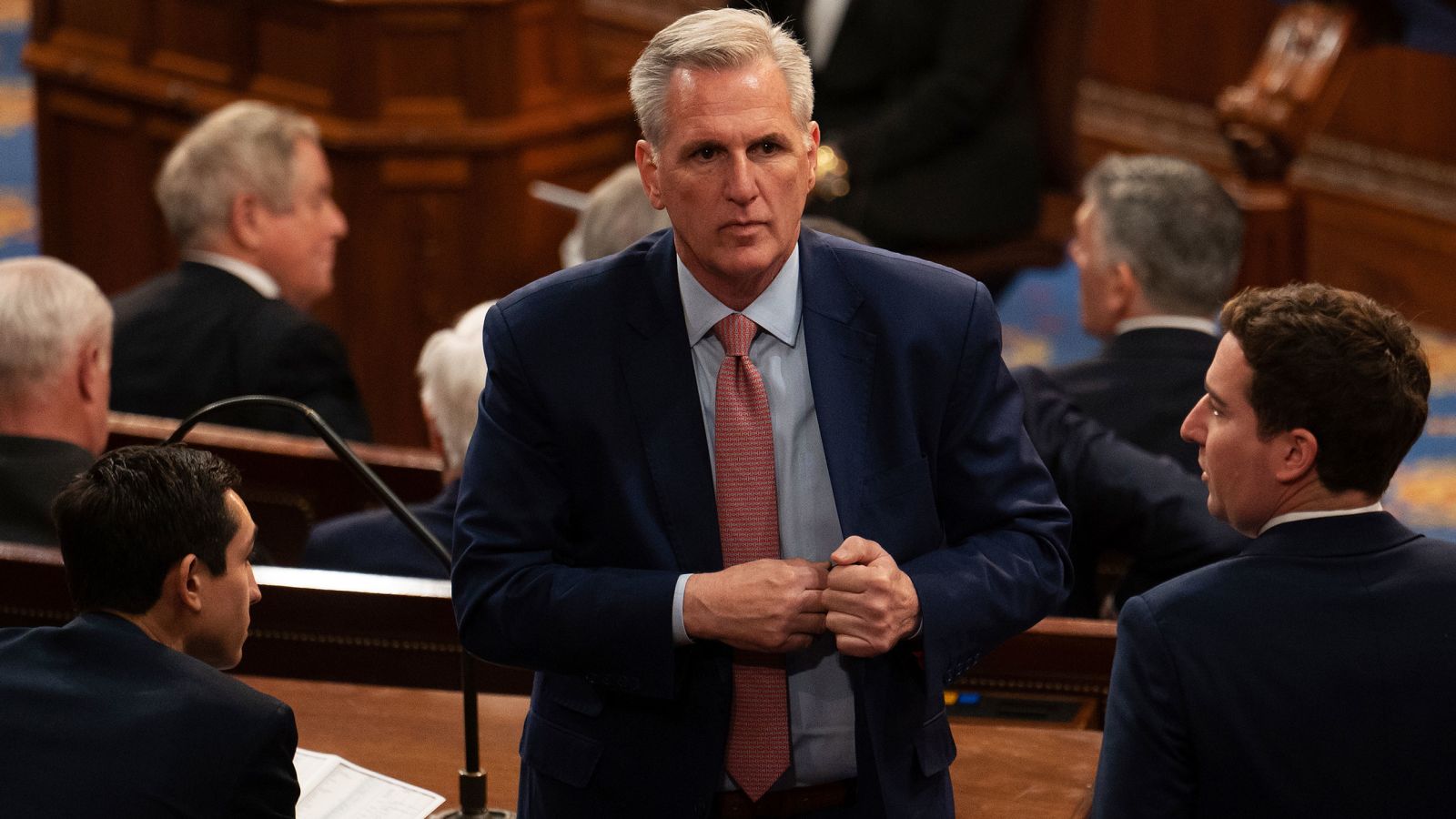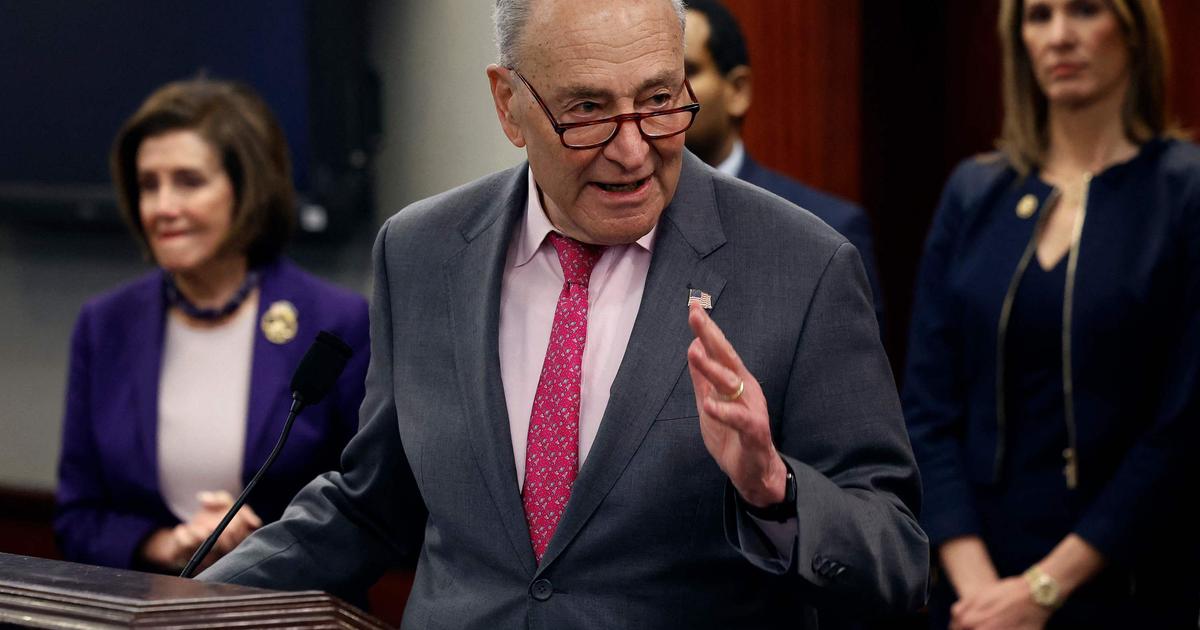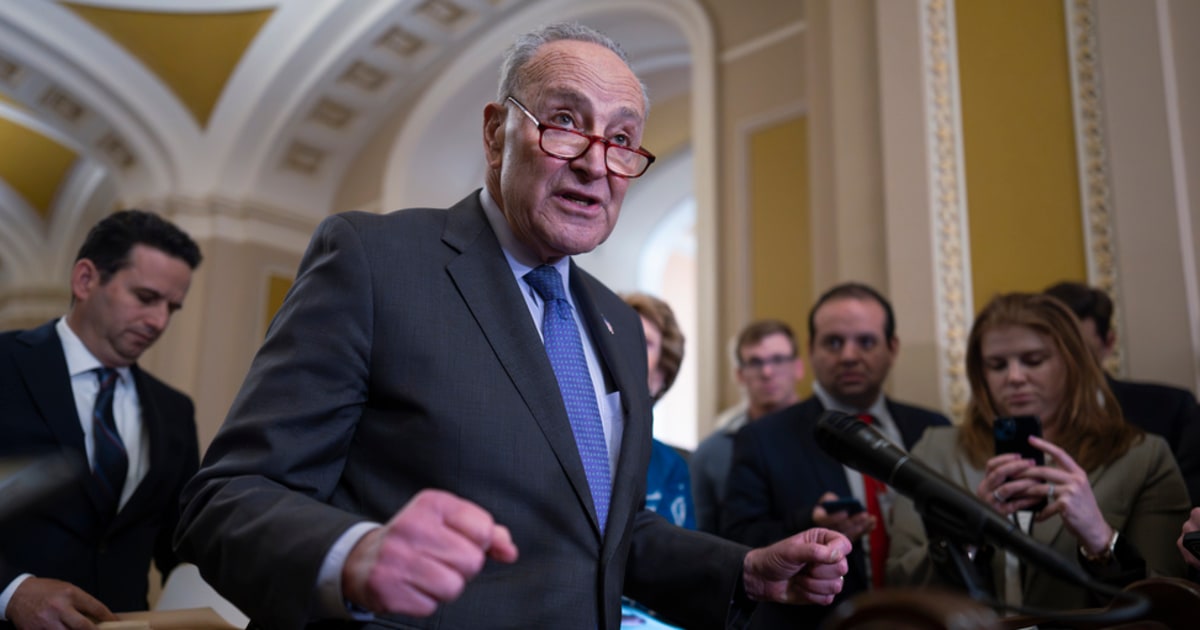McCarthy loses sixth ballot for House presidency 7:14
(CNN) --
After suffering another heavy defeat on Wednesday, in which he lost a sixth round of voting to become speaker of the US House of Representatives, Republican Kevin McCarthy proposed more key concessions in his campaign to get 218 votes — including a rule change that would allow only one member to call a vote to oust a sitting president, according to two sources familiar with the matter.
That concession comes as McCarthy is fighting for votes, with the House adjourned until 12 pm ET this Thursday.
The House Republican majority is locked in an impasse over opposition to McCarthy from a group of conservatives.
The fight, which began on the first day of the 118th Congress, has thrown the House's new Republican majority into chaos and undermined the party's agenda.
The Chamber will remain paralyzed until this conflict is resolved.
The situation is dire for McCarthy's political future, as his Republican allies begin to fear that he will not win his bid for president if the fight goes much further.
It's still not entirely clear whether McCarthy and his allies will be able to secure the votes, and the longer the fight drags on, the more in jeopardy his presidential bid will be.
But this Wednesday, however, there were signs that the negotiations could be progressing.
advertising
ANALYSIS |
Kevin McCarthy takes desperation to be Speaker of the House to a new level
McCarthy's latest concession represents a significant victory for hardline conservatives, after the California Republican had already proposed a five-member threshold, below current rules that require half the GOP to request such a vote to oust the president.
Many of the party's more moderate members worried that they would give in to the far right on this issue, as it could weaken the position of speaker of the House and cause chaos in their ranks.
In two other concessions, the sources said, McCarthy also agreed to allow more members of the Freedom Caucus to participate in the powerful House Rules Committee, which dictates how and which bills get to the floor, while also being able to vote on a handful of priority bills, such as proposed member term limits and a border security plan.
However, nothing is final and negotiations are still underway.
And Republican sources say that even if McCarthy's offer is accepted, he still wouldn't get the 218 votes he needs to be House speaker.
While these concessions could attract new support, different concerns have been raised by other opponents that have yet to be fully addressed.
Lawmakers continue to vote to elect the new Speaker of the House of Representatives at the US Capitol on January 4, 2023. (Credit: OLIVIER DOULIERY/AFP via Getty Images)
last minute negotiations
After a series of failed votes on Wednesday, the House adjourned for several hours while Republicans continued talks.
Texas Rep. Chip Roy, one of the conservatives who voted against McCarthy's run for president, told Republican leaders he thinks he can get 10 holdout votes if these ongoing negotiations prove successful, according to Republican sources familiar with with internal discussions.
He also said there are other detractors who might be willing to vote "present."
The sources said Wednesday's talks between McCarthy's allies and his resisters were the most productive and serious to date.
And in a sign of a breakthrough, a McCarthy-aligned super PAC (Political Action Committee) agreed to sit out the Republican primary for the Republican-safe seats, one of the big demands Conservatives had made but McCarthy refused. had resisted up to that point.
"We've had more arguments in the last two days sitting there than in the last fucking four years," Roy said as he left the Capitol Wednesday night.
Kevin McCarthy Doesn't Gain Enough Support: What Happens While There Is No Speaker of the US House of Representatives?
Still, even if these negotiations are successful and ten lawmakers join McCarthy, which is far from certain, that doesn't give McCarthy the 218 votes to win the presidency, so he would still have more work to do.
Incoming House Republican Majority Discipline Officer Tom Emmer said Wednesday night that negotiations on the next president have been "very, very constructive."
“There were a lot of members involved in this and now there are some people who are sitting down and having those discussions to see where they want to go next,” the Minnesota Republican said.
Uncertainty about the way forward
House Republicans have 222 seats in the new Congress, so for McCarthy to reach 218 votes he can only afford to lose four Republican votes.
The challenge for him is that he is up against a small but determined contingent of hardline conservatives who have so far succeeded in denying him votes to secure the House deck.
Kevin McCarthy talks with Jim Jordan, both Republicans, in the middle of the votes that must define who will be the next speaker of the US House of Representatives, on January 3, 2023. (Credit: Chip Somodevilla / Getty Images)
The group has used the influence it has with the slim Republican majority to extract concessions.
McCarthy has already conceded to several of his demands, including making it increasingly easier to unseat the Speaker of the House, but so far his efforts have not been enough.
The Chamber met this Wednesday to continue voting after three rounds of voting this Tuesday.
McCarthy fell short each time, failing to reach the majority threshold needed to secure the presidency.
As the voting continued on Tuesday, the situation was increasingly serious for McCarthy, because in each round of voting he lost more votes in favor of his candidacy.
The first ballot count for president was 203 for McCarthy, with 19 Republicans voting for other candidates.
The runoff tally was 203 votes for McCarthy with 19 votes for Republican Rep. Jim Jordan of Ohio.
In the third round of voting there were 202 votes for McCarthy and 20 votes for Jordan, and Rep. Byron Donalds joined the 19 Republican lawmakers who had voted against McCarthy in the first two rounds.
It was the first time a presidential election had gone through multiple ballots since 1923.
Everything you need to know about the election for the speaker of the US House of Representatives.
"My vote yesterday was basically to break a deadlock, because we were stuck and going nowhere," Donalds, a Republican from Florida, said Wednesday on "CNN This Morning."
“Right now, (McCarthy) doesn't have a path to get there.
If that comes up again, yes, I can support that, fine, but what is needed now is for the Republicans to come together and find a way to elect a president."
In the fourth round of voting, 20 Republicans voted together for Donalds as the group shifted their collective support from Jordan to Donalds.
Rep. Victoria Spartz of Indiana voted present, lowering McCarthy's threshold to 217.
Spartz told CNN that he did so because he wanted to allow more negotiations to address the concerns of the 20 members.
The final tally for the fifth ballot was again 201 votes for McCarthy, 20 for Donalds, and one vote present.
The final tally for the sixth vote was the same: 201 for McCarthy, 20 for Donalds, and one vote present.
Trump watches closely
Former President Donald Trump is closely watching the dynamics unfold on Capitol Hill, and his public support has been a key focus of McCarthy's efforts.
Former President Donald Trump.
Two Republican sources familiar with the matter said McCarthy's allies panicked Tuesday after the former president gave a tepid response to NBC News when asked about his support for McCarthy.
The former president also refused to issue a statement Monday reiterating his endorsement of McCarthy despite a behind-the-scenes effort by several of his allies to get Trump to do so, two sources said.
A close McCarthy ally began working behind the scenes lobbying for Trump to release a statement clarifying his support.
McCarthy and Trump later connected by phone, a call in which McCarthy said Trump told him he still had his back.
Trump gave a strong endorsement on Truth Social on Wednesday morning, imploring Republicans not to “TURN A BIG WIN INTO A GIANT SHAME LOSS” and urging them to vote for McCarthy.
Although Trump's statement might not move the needle among McCarthy's fiercest enemies, one of the sources said McCarthy's world was concerned that he would appear "weak" and give the impression that he was losing support, so they felt it was important to reverse the narrative.
Gaetz, one of the House Republicans opposed to McCarthy's run for president, called Trump's latest effort to help the California Republican "sad."
“This does not change my view of McCarthy, or Trump, or my vote,” Gaetz said in a statement to Fox News Digital on Wednesday, shortly after Trump came to McCarthy's defense on Truth Social.
Long a staunch Trump ally, Gaetz's refusal to budge on his desire for McCarthy to be House speaker raises new questions about the former president's waning influence over Republicans amid his third presidential campaign.
"If Matt Gaetz is ignoring you, that's not a good sign," said a Trump ally who is involved in his 2024 campaign.
Trump has been making calls on McCarthy's behalf for the past 24 hours in an attempt to break the conservative blockade against him, this person said, but his efforts have so far been unsuccessful.
A lawmaker who spoke with Trump Tuesday night suggested to the former president that he should run for House speaker, according to a person briefed on the call.
Trump demurred and continued to press this individual to support McCarthy, claiming that he would be a strong "America First" supporter.
CNN's Annie Grayer, Kristin Wilson, Kate Sullivan, Kit Maher, Ted Barrett, Gabby Orr, Kaitlan Collins and Jake Tapper contributed to this report.
CameraKevin McCarthyRepublican Party





/cloudfront-eu-central-1.images.arcpublishing.com/prisa/K3QCWCHZS3EFRAZAEGFWH3GLIY.jpg)

/cloudfront-eu-central-1.images.arcpublishing.com/prisa/YTHAYNQJRHOBVAPYHAT3GYMEHU.jpg)
